Unit 1 Great Scientists 学案(新人教版必修5)
文档属性
| 名称 | Unit 1 Great Scientists 学案(新人教版必修5) |
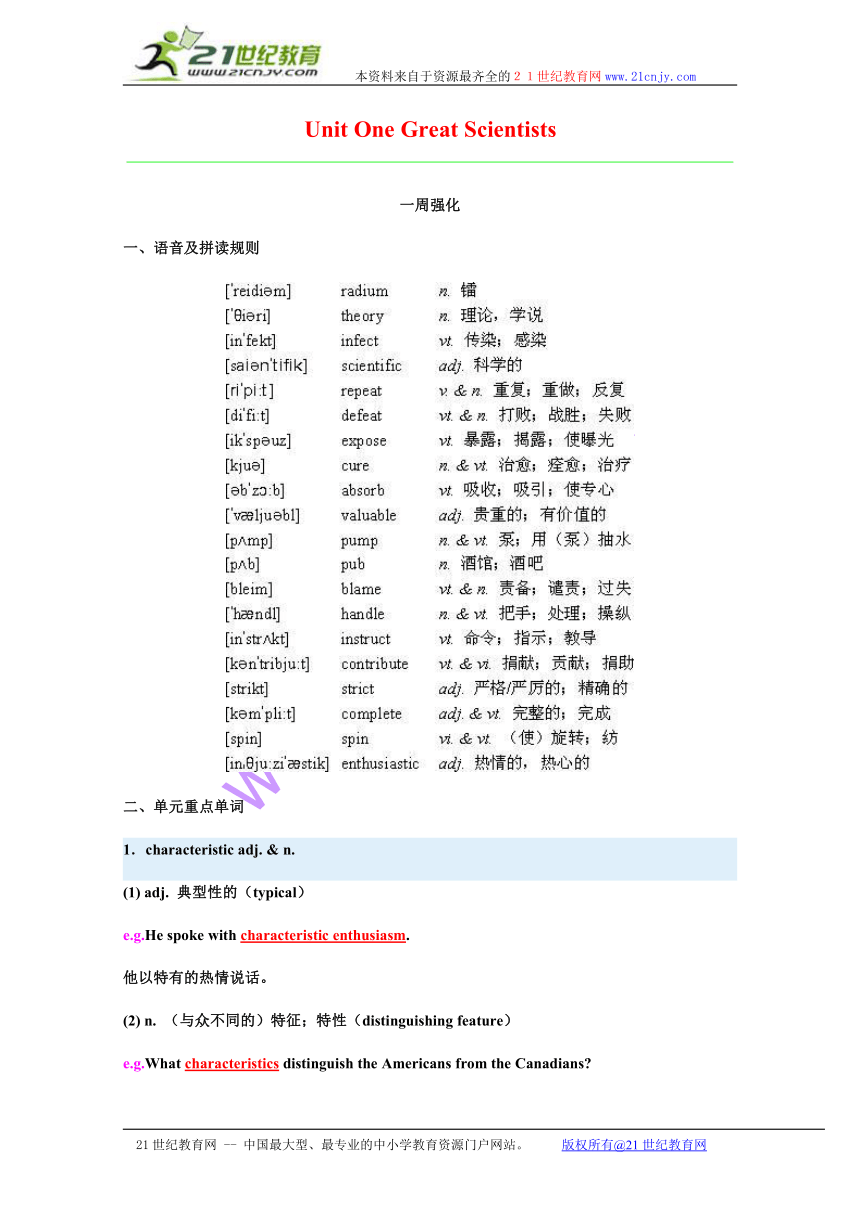
|
|
| 格式 | rar | ||
| 文件大小 | 72.1KB | ||
| 资源类型 | 教案 | ||
| 版本资源 | 人教版(新课程标准) | ||
| 科目 | 英语 | ||
| 更新时间 | 2009-07-07 00:00:00 | ||
图片预览

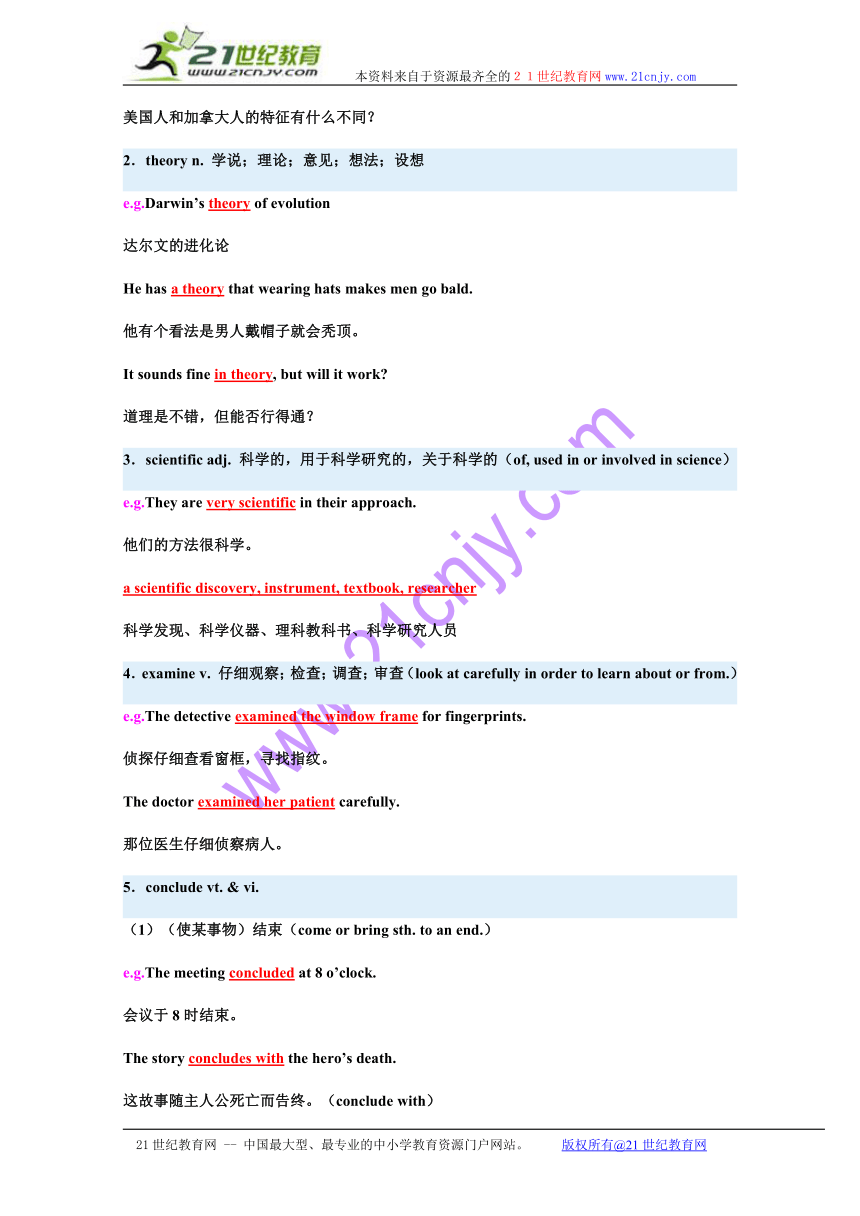
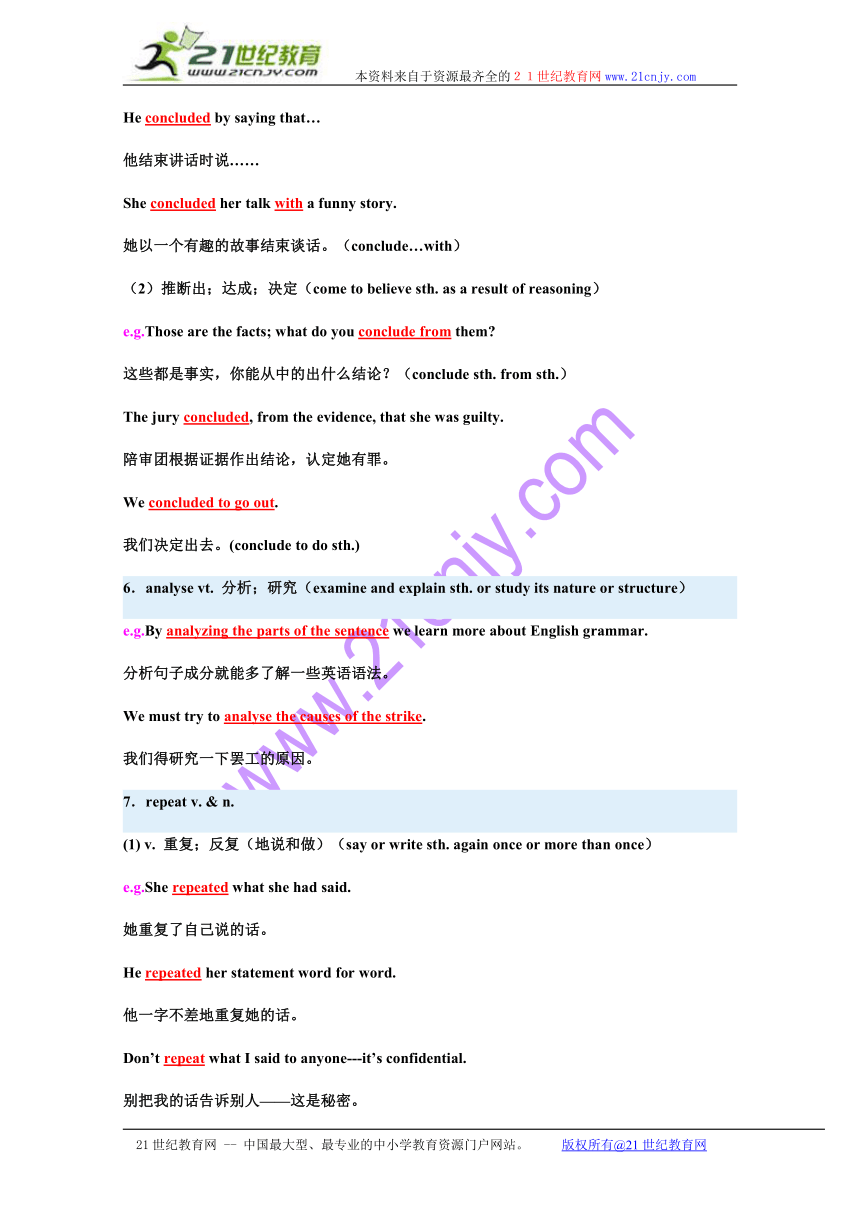
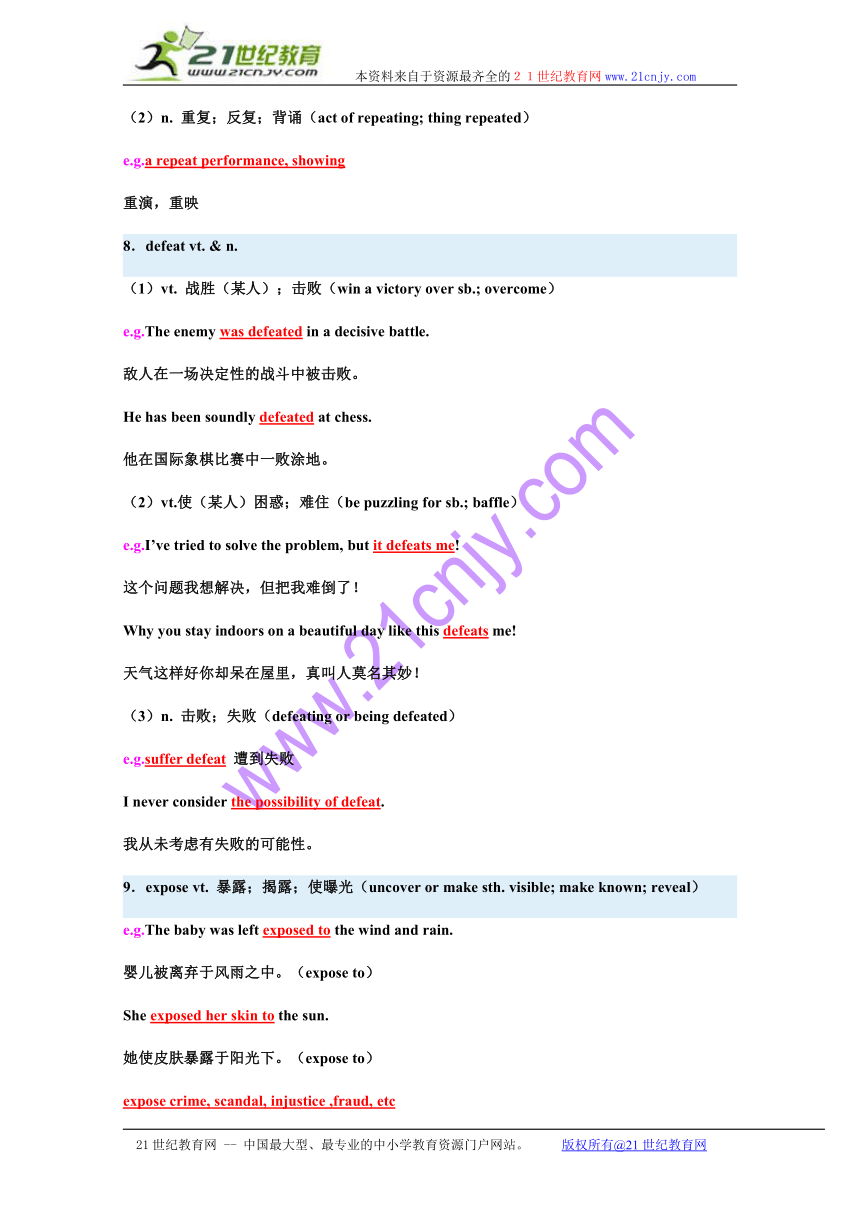
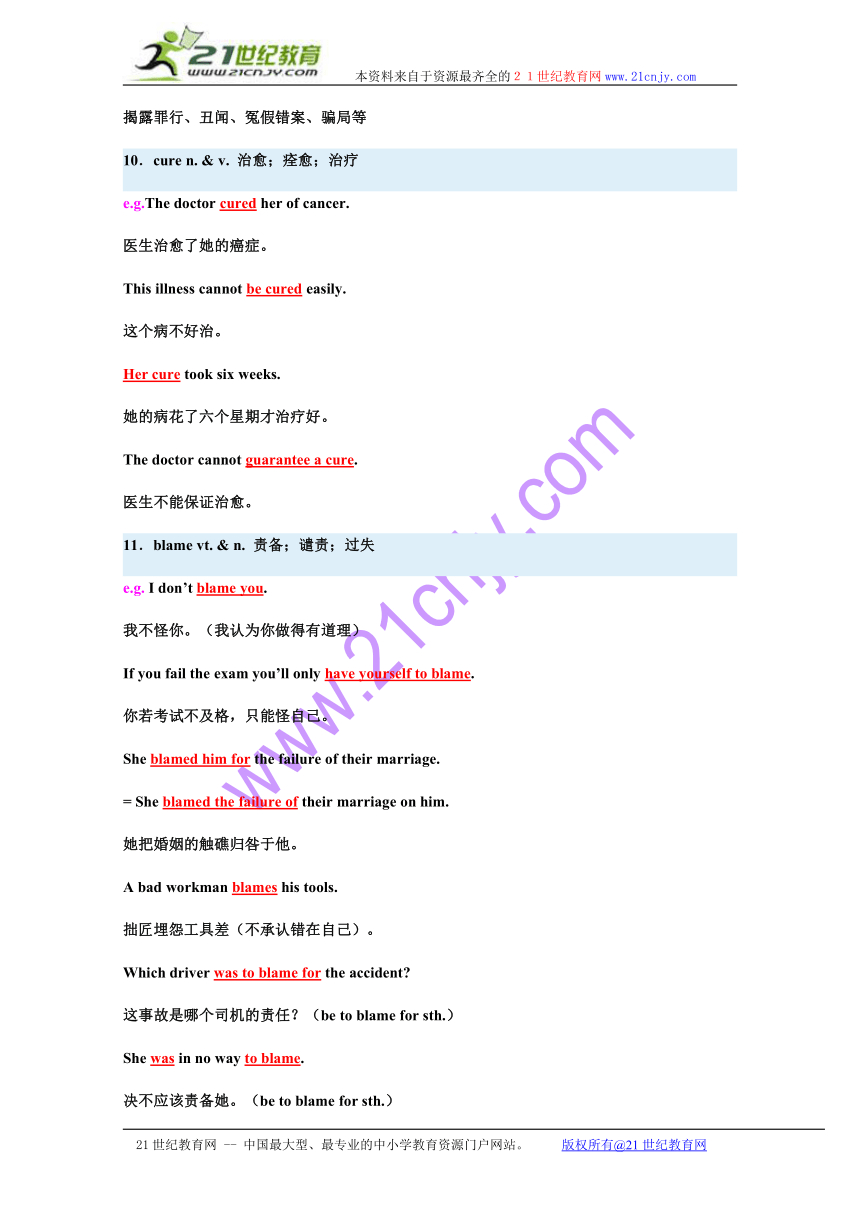
文档简介
本资料来自于资源最齐全的21世纪教育网www.21cnjy.com
Unit One Great Scientists
一周强化
一、语音及拼读规则
二、单元重点单词
1.characteristic adj. & n.
(1) adj. 典型性的(typical)
e.g.He spoke with characteristic enthusiasm.
他以特有的热情说话。
(2) n. (与众不同的)特征;特性(distinguishing feature)
e.g.What characteristics distinguish the Americans from the Canadians
美国人和加拿大人的特征有什么不同?
2.theory n. 学说;理论;意见;想法;设想
e.g.Darwin’s theory of evolution
达尔文的进化论
He has a theory that wearing hats makes men go bald.
他有个看法是男人戴帽子就会秃顶。
It sounds fine in theory, but will it work
道理是不错,但能否行得通?
3.scientific adj. 科学的,用于科学研究的,关于科学的(of, used in or involved in science)
e.g.They are very scientific in their approach.
他们的方法很科学。
a scientific discovery, instrument, textbook, researcher
科学发现、科学仪器、理科教科书、科学研究人员
4.examine v. 仔细观察;检查;调查;审查(look at carefully in order to learn about or from.)
e.g.The detective examined the window frame for fingerprints.
侦探仔细查看窗框,寻找指纹。
The doctor examined her patient carefully.
那位医生仔细侦察病人。
5.conclude vt. & vi.
(1)(使某事物)结束(come or bring sth. to an end.)
e.g.The meeting concluded at 8 o’clock.
会议于8时结束。
The story concludes with the hero’s death.
这故事随主人公死亡而告终。(conclude with)
He concluded by saying that…
他结束讲话时说……
She concluded her talk with a funny story.
她以一个有趣的故事结束谈话。(conclude…with)
(2)推断出;达成;决定(come to believe sth. as a result of reasoning)
e.g.Those are the facts; what do you conclude from them
这些都是事实,你能从中的出什么结论?(conclude sth. from sth.)
The jury concluded, from the evidence, that she was guilty.
陪审团根据证据作出结论,认定她有罪。
We concluded to go out.
我们决定出去。(conclude to do sth.)
6.analyse vt. 分析;研究(examine and explain sth. or study its nature or structure)
e.g.By analyzing the parts of the sentence we learn more about English grammar.
分析句子成分就能多了解一些英语语法。
We must try to analyse the causes of the strike.
我们得研究一下罢工的原因。
7.repeat v. & n.
(1) v. 重复;反复(地说和做)(say or write sth. again once or more than once)
e.g.She repeated what she had said.
她重复了自己说的话。
He repeated her statement word for word.
他一字不差地重复她的话。
Don’t repeat what I said to anyone---it’s confidential.
别把我的话告诉别人——这是秘密。
(2)n. 重复;反复;背诵(act of repeating; thing repeated)
e.g.a repeat performance, showing
重演,重映
8.defeat vt. & n.
(1)vt. 战胜(某人);击败(win a victory over sb.; overcome)
e.g.The enemy was defeated in a decisive battle.
敌人在一场决定性的战斗中被击败。
He has been soundly defeated at chess.
他在国际象棋比赛中一败涂地。
(2)vt.使(某人)困惑;难住(be puzzling for sb.; baffle)
e.g.I’ve tried to solve the problem, but it defeats me!
这个问题我想解决,但把我难倒了!
Why you stay indoors on a beautiful day like this defeats me!
天气这样好你却呆在屋里,真叫人莫名其妙!
(3)n. 击败;失败(defeating or being defeated)
e.g.suffer defeat 遭到失败
I never consider the possibility of defeat.
我从未考虑有失败的可能性。
9.expose vt. 暴露;揭露;使曝光(uncover or make sth. visible; make known; reveal)
e.g.The baby was left exposed to the wind and rain.
婴儿被离弃于风雨之中。(expose to)
She exposed her skin to the sun.
她使皮肤暴露于阳光下。(expose to)
expose crime, scandal, injustice ,fraud, etc
揭露罪行、丑闻、冤假错案、骗局等
10.cure n. & v. 治愈;痊愈;治疗
e.g.The doctor cured her of cancer.
医生治愈了她的癌症。
This illness cannot be cured easily.
这个病不好治。
Her cure took six weeks.
她的病花了六个星期才治疗好。
The doctor cannot guarantee a cure.
医生不能保证治愈。
11.blame vt. & n. 责备;谴责;过失
e.g. I don’t blame you.
我不怪你。(我认为你做得有道理)
If you fail the exam you’ll only have yourself to blame.
你若考试不及格,只能怪自己。
She blamed him for the failure of their marriage.
= She blamed the failure of their marriage on him.
她把婚姻的触礁归咎于他。
A bad workman blames his tools.
拙匠埋怨工具差(不承认错在自己)。
Which driver was to blame for the accident
这事故是哪个司机的责任?(be to blame for sth.)
She was in no way to blame.
决不应该责备她。(be to blame for sth.)
Where does the blame for our failure lie
我们失败的症结在哪里?
12.handle n. & vt. 把手;处理;操纵
e.g.His carelessness gave his enemies a handle to use against him.
他的不大意给予敌人以反对他的可乘之机。
Wash your hands before you handle food.
洗完手再拿食物。
Fragile---handle with care.
易碎品——小心轻放。
An officer must know how to handle his men.
当军官的应懂得怎样统帅士兵。
13.instruct vt. 命令;指示;教导
e.g.They haven’t instructed us where to go.
他们还未指示我们到何处去。
I’ve instructed them to keep the room locked.
我已吩咐他们那房间要上锁。
instruct—instructor(教员;教练;指导员)—instruction(n.)
14.contribute vt. & vi. 捐献;贡献;捐助——contributor——contribution
e.g. Everyone should contribute what he or she can afford.
人人都应该尽自己的能力作贡献。
He wants to contribute ten pounds to a charity collection.
他想捐献十英镑给慈善事业。
15.positive adj. 积极的;肯定的;确实的
e.g.She was quite positive about the amount of money involved.
他对所涉及的钱数十分肯定。(positive about/that)
Try to be more positive in dealing with the problem.
对解决该问题再积极一点。
You should always keep a positive feeling.
你应该经常保持乐观的情绪。
We have no positive proof of her guilt.
我们没有她犯罪的确切证据。
16.complete adj. & vt. 完整的;完成
e.g.It was a complete surprise to me.
这对我完全是件意外的事。
A few words of praise from her would have completed his happiness.
她要是能夸他两句,他也就心满意足了。
When will the railway be completed
铁路何时竣工?
17.enthusiastic adj. 热情的,热心的
e.g.He doesn’t know much about the subject, but he’s very enthusiastic.
他对这事所知不多,但却极感兴趣。
She’s very enthusiastic about singing.
她非常喜欢唱歌。
She greeted him enthusiastically with a kiss.
她热情地跟他打招呼并吻了他一下。
18.cautious adj. 小心的,谨慎的——caution n. & v.
e.g.He is a cautious driver.
他是一个谨慎的司机。
You should be cautious of strangers.
你可要小心提防陌生人。
19.reject vt. 拒绝;不接受;丢弃;抛弃
e.g.She rejected his offer of marriage.
他向她求婚,她拒绝了。
reject a gift, a possibility, an opinion, a suggestion
拒绝接受一件礼物、一种可能性、一条意见、一项建议
20.persuasive adj. 能说服人的;有说服力的(having the power to influence others into believing or doing what one wishes)
e.g.She is always persuasive.
An advertisement provides information and uses persuasive language and exciting images to encourage people to buy a product or service or believe in an idea.
persuade—persuasion—persuasive—persuasively—persuasiveness
(1)persuade v.
① 说服;劝说(to cause to do something by reasoning, arguing, begging, etc.)
e.g.Try to persuade him to come with us.
想办法说服他跟我们一块儿来。(persuade sb. to do sth.)
They persuaded us into/out of going to the party.
她们劝说我们去/不去参加聚会。(persuade sb. into/out of doing sth.)
②相信;使确信(to cause to feel certain; convince)
e.g.She was not persuaded of the truth of his statement.
她没有被说服相信他的话是真的。
(2)persuasion n. 说服,劝说;说服力 (the act of persuading or the ability to influence others)
e.g. She has the persuasion to let him come. 她能让他来。
(3)persuasively adv.
(4)persuasiveness n.
三、重点短语
1.steam engine 蒸汽机
2.put forward
(1)提出(要求,答案,计划,建议等)=come up with;
e.g. A good suggestion has already been put forward by the chairman.
主席已提出一项好的建议。
Einstein put forward his new theory of relativity.
爱因斯坦提出了相对论的新学说。
(2)推荐,提出(某人名字)
e.g.We put him forward as a candidate.
我们推荐他为候选人。
May I put your name forward as a possible chairman of the committee
我可以把你的名字作为委员会主席的合适人选推荐出来吗?
3.draw a conclusion 得出结论 = come to/reach a conclusion
e.g.What conclusion can we draw from this
我们能从中得出什么结论?
4.in addition 此外;又;
e.g.I met some friends and other people in addition.
我遇见了一些朋友,还遇见其他一些人。
Hollow bones are almost as strong as solid bones and in addition are much lighter.
空心骨头的强度不亚于实心骨头,此外,空心骨头要轻得多。
In addition, he was taught how to tie up parcels.
此外,还教了他怎么捆包裹。
[注意]in addition to的意思是“除……之外”(表示包括)。
e.g.In addition to English, he has to study a second foreign language.
除了英语,他还得学第二外语。
5.be strict with 对……严格的;对……严厉的
e.g.You ought to be stricter with him.
你应该对他更严格些。
You must not mind if you aunt is strict with you.
如果婶婶对你严厉的话,你一定不要在意。
6.lead to
(1)通向
e.g.The road leads to our factory.
那条路通向我们厂。
Every road leads to Rome.
条条大路通罗马。
(2)导致;引起
e.g.An ordinary cold can soon lead to a fever.
普通感冒可以很快引起发烧。
Virtue leads to happiness.
美德导致幸福。
7.make sense 讲得通,言之有理;有意义,能被理解
e.g.No matter how you read it, this sentence doesn’t make any sense.
不管一怎样读,这句话都讲不通。
She doesn’t talk much, but what she says makes sense.
她讲话不多,但言之有理。
What you say doesn’t make sense to me.
我不理解你的话。
8.point of view 态度;观点;看法
e.g.What’s your point of view about this
你对这件事情的看法怎样?
9.apart/aside from
(1)除……外(表示排除)= except (for), other than, with the exception of
e.g.I care for nothing apart from this.
除此以外,我别的都不要。
Apart from the high cost, the plan was a good one.
除了费用高外,这是个好计划。
(2)除……外还(表示增加)= in addition to
e.g.Apart from the cost, the hat doesn’t suit me.
除了价格外,这帽子对我也不合适。
Apart from being fun and good exercise, swimming is a very useful skill.
除了娱乐、运动以外,游泳还是一项很有用的技能。
四、重难点句子解析
1. Doctor John Snow was so famous that he attended Queen Victoria to ease the birth of her babies.
[译文]约翰·斯诺太富盛名了,以致于维多利亚女王生孩子时都是他去照料,帮助她顺利分娩。
attend vt. & vi.
(1)to be present at; go to (meeting, conference, lecture…) 出席;参加
e.g.He decided to attend the meeting himself.
他决定亲自赴会。
(2)to look after, care for, serve 照顾;看护
e.g.Which doctor is attending to on you
哪位医生护理你?
(3)to go with 伴随
e.g.The work was attended with much difficulty.
这项工作带来许多困难。
attendance n.
(1)the act of attending 照顾
e.g.There is a doctor in attendance.
有一位医生照顾。
(2)the number of people present 出席人数
e.g.There was a large attendance at the concert.
音乐会听众很多。
2. He knew it would never be controlled until its cause was found.
[译文]他知道,在找到病原前,疫情是无法控制的。
control v. & n.
(1)v. to have power over, rule, direct 统治,控制
e.g.You are trying to control me as though I were your slave.
你是想把我当作你的奴隶控制。
The government tries its best to control prices.
政府努力控制物价。
He cannot control his anger.
他无法抑制自己的愤怒情绪。
(2)n. 控制,统治,掌握 [相关短语如下]
① lose control of/be(go) out of control 失去控制
e.g.The driver lost control of his car and it knocked into a tree.
司机失去控制,车撞到树上。
The car was out of control and ran into a wall.
车失去控制,撞到了墙上。
② in control of 在……控制下
e.g.Mr Brown is in control of the money.
布郎先生管理钱财。
③ under the control of 被……控制着
e.g.This money is under the control of Mr. Brown.
钱财由一位布郎先生掌管。
3. The second suggested that people absorbed this disease into their bodies with their meals.
[译文]第二种看法是在吃饭的时候人们把这种病毒引入体内的。
absorb vt. & vi.
(1)to take or suck in (liquids) 吸收
e.g.A sponge absorbs water.
海绵吸水。
(2)to take in (knowledge, ideas)专心于
e.g.The little girl was absorbed in reading a tale.
这个小姑娘正在全神贯注地阅读一篇故事。
4. …, the cholera outbreak was so severe that more than 500 people had died in 10 days,…
[译文]霍乱流行得很严重,在10天之内就死去了500多人。
severe adj.
(1)so serious; so bad (人,纪律)严厉的,严格的
e.g.I think you are too severe on the boy.
我认为你对那个孩子太严厉。
His severe looks frightened me.
他的严厉表情使我恐慌。
(2)very harmful or painful; serious or uncomfortable (疼痛)剧烈的
e.g.SARS---severe acute respiratory syndrome(严重的,急性的呼吸道综合症)
He has a severe pain in his leg.
他的腿痛得厉害。
be severe with = be strict with 对……要求严格
e.g.He is severe with himself.
他严格要求自己。
5. With this evidence John Snow was able to announce with certainty that polluted water carried the disease.
[译文]有了这个证据,约翰·斯诺就能够肯定地宣布,这种被污染了的水携带着病毒。
announce v.
(1)to make know publicly 发表、告知、宣布……
e.g.The government announced its new economic policies.
政府发布了新的经济政策。
The news was announced to the public on TV.
这则消息经由电视向大众宣布。
(2)to state in a loud voice(the name of a person or thing on arrival)宣布(客人的名字、到达等)
e.g.His servant announced Mr. and Mrs. White.
他的仆人通报怀特夫妇驾临。
(3)to make clearly known(事情)显示……;预告
e.g.Warm sunshine announces the coming of spring.
温暖的阳光预示春天即将来到。
五、语法专项: 过去分词作定语和表语
(The Past Participle as the Attribute and the Predicative)
过去分词是非谓语动词的一种形式,表示完成和被动的动作。它在句子中可以充当表语、定语等成份。下面仅谈其作定语和表语的用法。
1.过去分词作定语
过去分词作定语有前置和后置两种情况。
(1)前置定语
单个的过去分词作定语,通常放在被修饰的名词之前,表示被动和完成意义。
A类:被动意义:
an honored guest
一位受尊敬的客人
The injured workers are now being taken good care of in the hospital.
受伤的工人现正在医院受到良好的照料。
B类:完成意义:
a retired teacher 一位退休的教师
They are cleaning the fallen leaves in the yard.
他们正在打扫院子里的落叶。
(2)后置定语
过去分词短语作定语时,通常放在被修饰的名词之后,它的作用相当于一个定语从句。如:
This will be the best novel of its kind ever written (=that has ever been written).
这将是这类小说中写得最好的。
Who were the so-called guests invited (=who had been invited) to your party last night
昨晚被邀请参加你的晚会的那些所谓的客人是谁呀
2.过去分词作表语
作表语的过去分词主要来自及物动词,在主-系-表句型中,说明主语所处的一种状态。其中系动词有包括be在内的多种形式。如:
You seem frightened.
你看样子受了惊吓。
少数不及物动词(如go, come, set)的过去分词也能作表语,但它们不表示被动意义,只是表示动作完成。如:
They are gone for vacation.
他们度假去了。
注意:要区别“系动词+过去分词(系表结构)” 和 “系动词+过去分词(被动语态)”。如:
A. The library is now closed.
图书馆现在关门了。
B. The library is closed at six.
图书馆经常在六点钟关门。
说明:作表语用的过去分词表示主语的特点或所处的状态,强调主谓关系。这种结构中的过去分词前可加quite, very, rather等修饰词。系动词可有多种,表示不同的意义;被动语态表示动作,强调动宾关系,绝大多数被动结构中的行为执行者还可以用by短语来表示。因此,我们不难看出在上面两句中,A句是系表结构,B句是被动语态。
高考解析
1. Most of the artists _____ to the party were from South Africa. (MET 1990)A. invited B. to inviteC. being invited D. had been invited答案:A解析: 此题考查过去分词作后置定语;过去分词短语作定语时,通常放在被修饰的名词之后,它的作用相当于一个定语从句。即 Most of the artists who had been invited to the party were from South Africa.2. The computer center, _____ last year, is very popular among the students in this school. (NMET 1993)A. open B. opening C. having opened D. opened答案:D解析: 从last year可以看出来应该选择过去式;同时这也是一个过去分词作后置定语的典型例子,相当于which is opened last year…3. Cleaning women in big cities usually get _____ by the hour.(NMET 1998)A. pay B. payingC. paid D. to pay答案:C解析: get paid本来就是一个短语,意思是“被付报酬”;从语法角度来讲,get是个系动词,相当于be动词,这里是被动语态的用法。
课外拓展
A nurse and her elderly uncle were waiting for a bus at a corner in downtown Chicago. Buses came by, but not the one they wanted. The woman finally half-entered one of the buses and asked the driver if the bus she wanted stopped at that corner. The driver looked at her but made no answer, so she repeated the question. To her great surprise, he then closed the door—on her arm—and drove off. The woman, her arm stuck in the door, ran alongside the bus, shouting. Passengers said the driver stopped after almost a block only because they, too, were shouting. When the driver finally did stop and open the door, the woman jumped on the bus to get his bus number. Then he took off again and went another couple of blocks before other shouting passengers persuaded him to stop and let the woman off. After the driver’s bosses at a tax—supported governmental company — heard of the incident, they looked into it and set his punishment: a five-day suspension without pay. That struck me as rather light. But Bill Baxa, the company’s public-relations man, said,“That’s a pretty serious punishment.” Five days off work is a serious punishment for dragging a woman alongside a bus by her arm Baxa said,“Any time you take money away from someone, it is a terrible punishment. The driver makes $ 14 an hour. Multiply that by 40 and you can see what he lost.” Yes, that comes to %560, a good sum. But we know that people in the private company are fired for far less every day. If the people who run the bus company think that the loss of a week’s pay is more than enough, I offer them a sporting suggestion: Give me a bus. Then have their wives stick their arms in the doorway of the bus, and I’ll slam the door shut, start the bus quickly and take them for a fast one-block run. And I’ll pay % 560 to anyone who is bold enough to try it. Any takers Mr. Baxa Anybody I didn’t think so.1.The nurse half-entered one of the buses because ______.A.the bus they wanted didn’t’ stop thereB.she wanted the driver to stop the busC.she wanted to get some information from the driverD.she and her uncle couldn’t wait any longer at the corner2.How many blocks was the woman away from the corner where she waited when the bus driver finally let her off A.Almost one block.B.Almost two blocks.C.Probably three blocks.D.Probably five or six blocks.3.Why did the author offer a sporting proposition A.Because the CTA paid little attention to the incident.B.Because the bus driver had not been fired.C.Because he wanted to threaten the CTA people.D.Because he thought the punishment was not a serious one.4.From this passage we may infer that _______.A.many people in the private sector are fired for minor mistakes every dayB.people in the private sector usually get more punishment than those in the public sectorC.people in the private sector get much higher pay than those in the public sectorD.people in the private sector are better trained than those in the public sector5.Which of the following is NOT true A.The company is a bus company supported by the governmentB.The writer and Mr. Baxa disagreed with each other on the bus company’s decision.C.The driver finally stopped the bus under the pressure of the passengers.D.The writer asked the bus company to give him a bus if his suggestion was refused.答案与解析: 1.[答案]C [解析]从第一段最后一句The woman finally half-entered one of the buses and asked the driver if the bus she wanted stopped at that corner.可以看出来,她只是想问问那个司机这趟车是否到达他们想去的地方。 2.[答案]C [解析]细节题。第三段Passengers said the driver stopped after almost a block…可见刚开始在一个block过去后停了一下,然而真正让妇女下车是在第四段Then he took off again and went another couple of blocks before other shouting passengers persuaded him to stop and let the woman off.后,也就是总共过了三条街道。 3.[答案]D [解析] sporting proposition 就是sporting suggestion,文章第八段出现了,之所以举这个例子,是因为作者认为That struck me as rather light.为了推翻Bill Baxa的观点错误而提出的建议。 4.[答案]B [解析]从But we know that people in the private company are fired for far less every day.而文章所讲的是关于惩罚的问题,可以看出B是正确答案。 5.[答案]D [解析]作者并不是想要一辆公共汽车,他只是举个例子来证明自己的观点。
21世纪教育网 -- 中国最大型、最专业的中小学教育资源门户网站。 版权所有@21世纪教育网
Unit One Great Scientists
一周强化
一、语音及拼读规则
二、单元重点单词
1.characteristic adj. & n.
(1) adj. 典型性的(typical)
e.g.He spoke with characteristic enthusiasm.
他以特有的热情说话。
(2) n. (与众不同的)特征;特性(distinguishing feature)
e.g.What characteristics distinguish the Americans from the Canadians
美国人和加拿大人的特征有什么不同?
2.theory n. 学说;理论;意见;想法;设想
e.g.Darwin’s theory of evolution
达尔文的进化论
He has a theory that wearing hats makes men go bald.
他有个看法是男人戴帽子就会秃顶。
It sounds fine in theory, but will it work
道理是不错,但能否行得通?
3.scientific adj. 科学的,用于科学研究的,关于科学的(of, used in or involved in science)
e.g.They are very scientific in their approach.
他们的方法很科学。
a scientific discovery, instrument, textbook, researcher
科学发现、科学仪器、理科教科书、科学研究人员
4.examine v. 仔细观察;检查;调查;审查(look at carefully in order to learn about or from.)
e.g.The detective examined the window frame for fingerprints.
侦探仔细查看窗框,寻找指纹。
The doctor examined her patient carefully.
那位医生仔细侦察病人。
5.conclude vt. & vi.
(1)(使某事物)结束(come or bring sth. to an end.)
e.g.The meeting concluded at 8 o’clock.
会议于8时结束。
The story concludes with the hero’s death.
这故事随主人公死亡而告终。(conclude with)
He concluded by saying that…
他结束讲话时说……
She concluded her talk with a funny story.
她以一个有趣的故事结束谈话。(conclude…with)
(2)推断出;达成;决定(come to believe sth. as a result of reasoning)
e.g.Those are the facts; what do you conclude from them
这些都是事实,你能从中的出什么结论?(conclude sth. from sth.)
The jury concluded, from the evidence, that she was guilty.
陪审团根据证据作出结论,认定她有罪。
We concluded to go out.
我们决定出去。(conclude to do sth.)
6.analyse vt. 分析;研究(examine and explain sth. or study its nature or structure)
e.g.By analyzing the parts of the sentence we learn more about English grammar.
分析句子成分就能多了解一些英语语法。
We must try to analyse the causes of the strike.
我们得研究一下罢工的原因。
7.repeat v. & n.
(1) v. 重复;反复(地说和做)(say or write sth. again once or more than once)
e.g.She repeated what she had said.
她重复了自己说的话。
He repeated her statement word for word.
他一字不差地重复她的话。
Don’t repeat what I said to anyone---it’s confidential.
别把我的话告诉别人——这是秘密。
(2)n. 重复;反复;背诵(act of repeating; thing repeated)
e.g.a repeat performance, showing
重演,重映
8.defeat vt. & n.
(1)vt. 战胜(某人);击败(win a victory over sb.; overcome)
e.g.The enemy was defeated in a decisive battle.
敌人在一场决定性的战斗中被击败。
He has been soundly defeated at chess.
他在国际象棋比赛中一败涂地。
(2)vt.使(某人)困惑;难住(be puzzling for sb.; baffle)
e.g.I’ve tried to solve the problem, but it defeats me!
这个问题我想解决,但把我难倒了!
Why you stay indoors on a beautiful day like this defeats me!
天气这样好你却呆在屋里,真叫人莫名其妙!
(3)n. 击败;失败(defeating or being defeated)
e.g.suffer defeat 遭到失败
I never consider the possibility of defeat.
我从未考虑有失败的可能性。
9.expose vt. 暴露;揭露;使曝光(uncover or make sth. visible; make known; reveal)
e.g.The baby was left exposed to the wind and rain.
婴儿被离弃于风雨之中。(expose to)
She exposed her skin to the sun.
她使皮肤暴露于阳光下。(expose to)
expose crime, scandal, injustice ,fraud, etc
揭露罪行、丑闻、冤假错案、骗局等
10.cure n. & v. 治愈;痊愈;治疗
e.g.The doctor cured her of cancer.
医生治愈了她的癌症。
This illness cannot be cured easily.
这个病不好治。
Her cure took six weeks.
她的病花了六个星期才治疗好。
The doctor cannot guarantee a cure.
医生不能保证治愈。
11.blame vt. & n. 责备;谴责;过失
e.g. I don’t blame you.
我不怪你。(我认为你做得有道理)
If you fail the exam you’ll only have yourself to blame.
你若考试不及格,只能怪自己。
She blamed him for the failure of their marriage.
= She blamed the failure of their marriage on him.
她把婚姻的触礁归咎于他。
A bad workman blames his tools.
拙匠埋怨工具差(不承认错在自己)。
Which driver was to blame for the accident
这事故是哪个司机的责任?(be to blame for sth.)
She was in no way to blame.
决不应该责备她。(be to blame for sth.)
Where does the blame for our failure lie
我们失败的症结在哪里?
12.handle n. & vt. 把手;处理;操纵
e.g.His carelessness gave his enemies a handle to use against him.
他的不大意给予敌人以反对他的可乘之机。
Wash your hands before you handle food.
洗完手再拿食物。
Fragile---handle with care.
易碎品——小心轻放。
An officer must know how to handle his men.
当军官的应懂得怎样统帅士兵。
13.instruct vt. 命令;指示;教导
e.g.They haven’t instructed us where to go.
他们还未指示我们到何处去。
I’ve instructed them to keep the room locked.
我已吩咐他们那房间要上锁。
instruct—instructor(教员;教练;指导员)—instruction(n.)
14.contribute vt. & vi. 捐献;贡献;捐助——contributor——contribution
e.g. Everyone should contribute what he or she can afford.
人人都应该尽自己的能力作贡献。
He wants to contribute ten pounds to a charity collection.
他想捐献十英镑给慈善事业。
15.positive adj. 积极的;肯定的;确实的
e.g.She was quite positive about the amount of money involved.
他对所涉及的钱数十分肯定。(positive about/that)
Try to be more positive in dealing with the problem.
对解决该问题再积极一点。
You should always keep a positive feeling.
你应该经常保持乐观的情绪。
We have no positive proof of her guilt.
我们没有她犯罪的确切证据。
16.complete adj. & vt. 完整的;完成
e.g.It was a complete surprise to me.
这对我完全是件意外的事。
A few words of praise from her would have completed his happiness.
她要是能夸他两句,他也就心满意足了。
When will the railway be completed
铁路何时竣工?
17.enthusiastic adj. 热情的,热心的
e.g.He doesn’t know much about the subject, but he’s very enthusiastic.
他对这事所知不多,但却极感兴趣。
She’s very enthusiastic about singing.
她非常喜欢唱歌。
She greeted him enthusiastically with a kiss.
她热情地跟他打招呼并吻了他一下。
18.cautious adj. 小心的,谨慎的——caution n. & v.
e.g.He is a cautious driver.
他是一个谨慎的司机。
You should be cautious of strangers.
你可要小心提防陌生人。
19.reject vt. 拒绝;不接受;丢弃;抛弃
e.g.She rejected his offer of marriage.
他向她求婚,她拒绝了。
reject a gift, a possibility, an opinion, a suggestion
拒绝接受一件礼物、一种可能性、一条意见、一项建议
20.persuasive adj. 能说服人的;有说服力的(having the power to influence others into believing or doing what one wishes)
e.g.She is always persuasive.
An advertisement provides information and uses persuasive language and exciting images to encourage people to buy a product or service or believe in an idea.
persuade—persuasion—persuasive—persuasively—persuasiveness
(1)persuade v.
① 说服;劝说(to cause to do something by reasoning, arguing, begging, etc.)
e.g.Try to persuade him to come with us.
想办法说服他跟我们一块儿来。(persuade sb. to do sth.)
They persuaded us into/out of going to the party.
她们劝说我们去/不去参加聚会。(persuade sb. into/out of doing sth.)
②相信;使确信(to cause to feel certain; convince)
e.g.She was not persuaded of the truth of his statement.
她没有被说服相信他的话是真的。
(2)persuasion n. 说服,劝说;说服力 (the act of persuading or the ability to influence others)
e.g. She has the persuasion to let him come. 她能让他来。
(3)persuasively adv.
(4)persuasiveness n.
三、重点短语
1.steam engine 蒸汽机
2.put forward
(1)提出(要求,答案,计划,建议等)=come up with;
e.g. A good suggestion has already been put forward by the chairman.
主席已提出一项好的建议。
Einstein put forward his new theory of relativity.
爱因斯坦提出了相对论的新学说。
(2)推荐,提出(某人名字)
e.g.We put him forward as a candidate.
我们推荐他为候选人。
May I put your name forward as a possible chairman of the committee
我可以把你的名字作为委员会主席的合适人选推荐出来吗?
3.draw a conclusion 得出结论 = come to/reach a conclusion
e.g.What conclusion can we draw from this
我们能从中得出什么结论?
4.in addition 此外;又;
e.g.I met some friends and other people in addition.
我遇见了一些朋友,还遇见其他一些人。
Hollow bones are almost as strong as solid bones and in addition are much lighter.
空心骨头的强度不亚于实心骨头,此外,空心骨头要轻得多。
In addition, he was taught how to tie up parcels.
此外,还教了他怎么捆包裹。
[注意]in addition to的意思是“除……之外”(表示包括)。
e.g.In addition to English, he has to study a second foreign language.
除了英语,他还得学第二外语。
5.be strict with 对……严格的;对……严厉的
e.g.You ought to be stricter with him.
你应该对他更严格些。
You must not mind if you aunt is strict with you.
如果婶婶对你严厉的话,你一定不要在意。
6.lead to
(1)通向
e.g.The road leads to our factory.
那条路通向我们厂。
Every road leads to Rome.
条条大路通罗马。
(2)导致;引起
e.g.An ordinary cold can soon lead to a fever.
普通感冒可以很快引起发烧。
Virtue leads to happiness.
美德导致幸福。
7.make sense 讲得通,言之有理;有意义,能被理解
e.g.No matter how you read it, this sentence doesn’t make any sense.
不管一怎样读,这句话都讲不通。
She doesn’t talk much, but what she says makes sense.
她讲话不多,但言之有理。
What you say doesn’t make sense to me.
我不理解你的话。
8.point of view 态度;观点;看法
e.g.What’s your point of view about this
你对这件事情的看法怎样?
9.apart/aside from
(1)除……外(表示排除)= except (for), other than, with the exception of
e.g.I care for nothing apart from this.
除此以外,我别的都不要。
Apart from the high cost, the plan was a good one.
除了费用高外,这是个好计划。
(2)除……外还(表示增加)= in addition to
e.g.Apart from the cost, the hat doesn’t suit me.
除了价格外,这帽子对我也不合适。
Apart from being fun and good exercise, swimming is a very useful skill.
除了娱乐、运动以外,游泳还是一项很有用的技能。
四、重难点句子解析
1. Doctor John Snow was so famous that he attended Queen Victoria to ease the birth of her babies.
[译文]约翰·斯诺太富盛名了,以致于维多利亚女王生孩子时都是他去照料,帮助她顺利分娩。
attend vt. & vi.
(1)to be present at; go to (meeting, conference, lecture…) 出席;参加
e.g.He decided to attend the meeting himself.
他决定亲自赴会。
(2)to look after, care for, serve 照顾;看护
e.g.Which doctor is attending to on you
哪位医生护理你?
(3)to go with 伴随
e.g.The work was attended with much difficulty.
这项工作带来许多困难。
attendance n.
(1)the act of attending 照顾
e.g.There is a doctor in attendance.
有一位医生照顾。
(2)the number of people present 出席人数
e.g.There was a large attendance at the concert.
音乐会听众很多。
2. He knew it would never be controlled until its cause was found.
[译文]他知道,在找到病原前,疫情是无法控制的。
control v. & n.
(1)v. to have power over, rule, direct 统治,控制
e.g.You are trying to control me as though I were your slave.
你是想把我当作你的奴隶控制。
The government tries its best to control prices.
政府努力控制物价。
He cannot control his anger.
他无法抑制自己的愤怒情绪。
(2)n. 控制,统治,掌握 [相关短语如下]
① lose control of/be(go) out of control 失去控制
e.g.The driver lost control of his car and it knocked into a tree.
司机失去控制,车撞到树上。
The car was out of control and ran into a wall.
车失去控制,撞到了墙上。
② in control of 在……控制下
e.g.Mr Brown is in control of the money.
布郎先生管理钱财。
③ under the control of 被……控制着
e.g.This money is under the control of Mr. Brown.
钱财由一位布郎先生掌管。
3. The second suggested that people absorbed this disease into their bodies with their meals.
[译文]第二种看法是在吃饭的时候人们把这种病毒引入体内的。
absorb vt. & vi.
(1)to take or suck in (liquids) 吸收
e.g.A sponge absorbs water.
海绵吸水。
(2)to take in (knowledge, ideas)专心于
e.g.The little girl was absorbed in reading a tale.
这个小姑娘正在全神贯注地阅读一篇故事。
4. …, the cholera outbreak was so severe that more than 500 people had died in 10 days,…
[译文]霍乱流行得很严重,在10天之内就死去了500多人。
severe adj.
(1)so serious; so bad (人,纪律)严厉的,严格的
e.g.I think you are too severe on the boy.
我认为你对那个孩子太严厉。
His severe looks frightened me.
他的严厉表情使我恐慌。
(2)very harmful or painful; serious or uncomfortable (疼痛)剧烈的
e.g.SARS---severe acute respiratory syndrome(严重的,急性的呼吸道综合症)
He has a severe pain in his leg.
他的腿痛得厉害。
be severe with = be strict with 对……要求严格
e.g.He is severe with himself.
他严格要求自己。
5. With this evidence John Snow was able to announce with certainty that polluted water carried the disease.
[译文]有了这个证据,约翰·斯诺就能够肯定地宣布,这种被污染了的水携带着病毒。
announce v.
(1)to make know publicly 发表、告知、宣布……
e.g.The government announced its new economic policies.
政府发布了新的经济政策。
The news was announced to the public on TV.
这则消息经由电视向大众宣布。
(2)to state in a loud voice(the name of a person or thing on arrival)宣布(客人的名字、到达等)
e.g.His servant announced Mr. and Mrs. White.
他的仆人通报怀特夫妇驾临。
(3)to make clearly known(事情)显示……;预告
e.g.Warm sunshine announces the coming of spring.
温暖的阳光预示春天即将来到。
五、语法专项: 过去分词作定语和表语
(The Past Participle as the Attribute and the Predicative)
过去分词是非谓语动词的一种形式,表示完成和被动的动作。它在句子中可以充当表语、定语等成份。下面仅谈其作定语和表语的用法。
1.过去分词作定语
过去分词作定语有前置和后置两种情况。
(1)前置定语
单个的过去分词作定语,通常放在被修饰的名词之前,表示被动和完成意义。
A类:被动意义:
an honored guest
一位受尊敬的客人
The injured workers are now being taken good care of in the hospital.
受伤的工人现正在医院受到良好的照料。
B类:完成意义:
a retired teacher 一位退休的教师
They are cleaning the fallen leaves in the yard.
他们正在打扫院子里的落叶。
(2)后置定语
过去分词短语作定语时,通常放在被修饰的名词之后,它的作用相当于一个定语从句。如:
This will be the best novel of its kind ever written (=that has ever been written).
这将是这类小说中写得最好的。
Who were the so-called guests invited (=who had been invited) to your party last night
昨晚被邀请参加你的晚会的那些所谓的客人是谁呀
2.过去分词作表语
作表语的过去分词主要来自及物动词,在主-系-表句型中,说明主语所处的一种状态。其中系动词有包括be在内的多种形式。如:
You seem frightened.
你看样子受了惊吓。
少数不及物动词(如go, come, set)的过去分词也能作表语,但它们不表示被动意义,只是表示动作完成。如:
They are gone for vacation.
他们度假去了。
注意:要区别“系动词+过去分词(系表结构)” 和 “系动词+过去分词(被动语态)”。如:
A. The library is now closed.
图书馆现在关门了。
B. The library is closed at six.
图书馆经常在六点钟关门。
说明:作表语用的过去分词表示主语的特点或所处的状态,强调主谓关系。这种结构中的过去分词前可加quite, very, rather等修饰词。系动词可有多种,表示不同的意义;被动语态表示动作,强调动宾关系,绝大多数被动结构中的行为执行者还可以用by短语来表示。因此,我们不难看出在上面两句中,A句是系表结构,B句是被动语态。
高考解析
1. Most of the artists _____ to the party were from South Africa. (MET 1990)A. invited B. to inviteC. being invited D. had been invited答案:A解析: 此题考查过去分词作后置定语;过去分词短语作定语时,通常放在被修饰的名词之后,它的作用相当于一个定语从句。即 Most of the artists who had been invited to the party were from South Africa.2. The computer center, _____ last year, is very popular among the students in this school. (NMET 1993)A. open B. opening C. having opened D. opened答案:D解析: 从last year可以看出来应该选择过去式;同时这也是一个过去分词作后置定语的典型例子,相当于which is opened last year…3. Cleaning women in big cities usually get _____ by the hour.(NMET 1998)A. pay B. payingC. paid D. to pay答案:C解析: get paid本来就是一个短语,意思是“被付报酬”;从语法角度来讲,get是个系动词,相当于be动词,这里是被动语态的用法。
课外拓展
A nurse and her elderly uncle were waiting for a bus at a corner in downtown Chicago. Buses came by, but not the one they wanted. The woman finally half-entered one of the buses and asked the driver if the bus she wanted stopped at that corner. The driver looked at her but made no answer, so she repeated the question. To her great surprise, he then closed the door—on her arm—and drove off. The woman, her arm stuck in the door, ran alongside the bus, shouting. Passengers said the driver stopped after almost a block only because they, too, were shouting. When the driver finally did stop and open the door, the woman jumped on the bus to get his bus number. Then he took off again and went another couple of blocks before other shouting passengers persuaded him to stop and let the woman off. After the driver’s bosses at a tax—supported governmental company — heard of the incident, they looked into it and set his punishment: a five-day suspension without pay. That struck me as rather light. But Bill Baxa, the company’s public-relations man, said,“That’s a pretty serious punishment.” Five days off work is a serious punishment for dragging a woman alongside a bus by her arm Baxa said,“Any time you take money away from someone, it is a terrible punishment. The driver makes $ 14 an hour. Multiply that by 40 and you can see what he lost.” Yes, that comes to %560, a good sum. But we know that people in the private company are fired for far less every day. If the people who run the bus company think that the loss of a week’s pay is more than enough, I offer them a sporting suggestion: Give me a bus. Then have their wives stick their arms in the doorway of the bus, and I’ll slam the door shut, start the bus quickly and take them for a fast one-block run. And I’ll pay % 560 to anyone who is bold enough to try it. Any takers Mr. Baxa Anybody I didn’t think so.1.The nurse half-entered one of the buses because ______.A.the bus they wanted didn’t’ stop thereB.she wanted the driver to stop the busC.she wanted to get some information from the driverD.she and her uncle couldn’t wait any longer at the corner2.How many blocks was the woman away from the corner where she waited when the bus driver finally let her off A.Almost one block.B.Almost two blocks.C.Probably three blocks.D.Probably five or six blocks.3.Why did the author offer a sporting proposition A.Because the CTA paid little attention to the incident.B.Because the bus driver had not been fired.C.Because he wanted to threaten the CTA people.D.Because he thought the punishment was not a serious one.4.From this passage we may infer that _______.A.many people in the private sector are fired for minor mistakes every dayB.people in the private sector usually get more punishment than those in the public sectorC.people in the private sector get much higher pay than those in the public sectorD.people in the private sector are better trained than those in the public sector5.Which of the following is NOT true A.The company is a bus company supported by the governmentB.The writer and Mr. Baxa disagreed with each other on the bus company’s decision.C.The driver finally stopped the bus under the pressure of the passengers.D.The writer asked the bus company to give him a bus if his suggestion was refused.答案与解析: 1.[答案]C [解析]从第一段最后一句The woman finally half-entered one of the buses and asked the driver if the bus she wanted stopped at that corner.可以看出来,她只是想问问那个司机这趟车是否到达他们想去的地方。 2.[答案]C [解析]细节题。第三段Passengers said the driver stopped after almost a block…可见刚开始在一个block过去后停了一下,然而真正让妇女下车是在第四段Then he took off again and went another couple of blocks before other shouting passengers persuaded him to stop and let the woman off.后,也就是总共过了三条街道。 3.[答案]D [解析] sporting proposition 就是sporting suggestion,文章第八段出现了,之所以举这个例子,是因为作者认为That struck me as rather light.为了推翻Bill Baxa的观点错误而提出的建议。 4.[答案]B [解析]从But we know that people in the private company are fired for far less every day.而文章所讲的是关于惩罚的问题,可以看出B是正确答案。 5.[答案]D [解析]作者并不是想要一辆公共汽车,他只是举个例子来证明自己的观点。
21世纪教育网 -- 中国最大型、最专业的中小学教育资源门户网站。 版权所有@21世纪教育网
